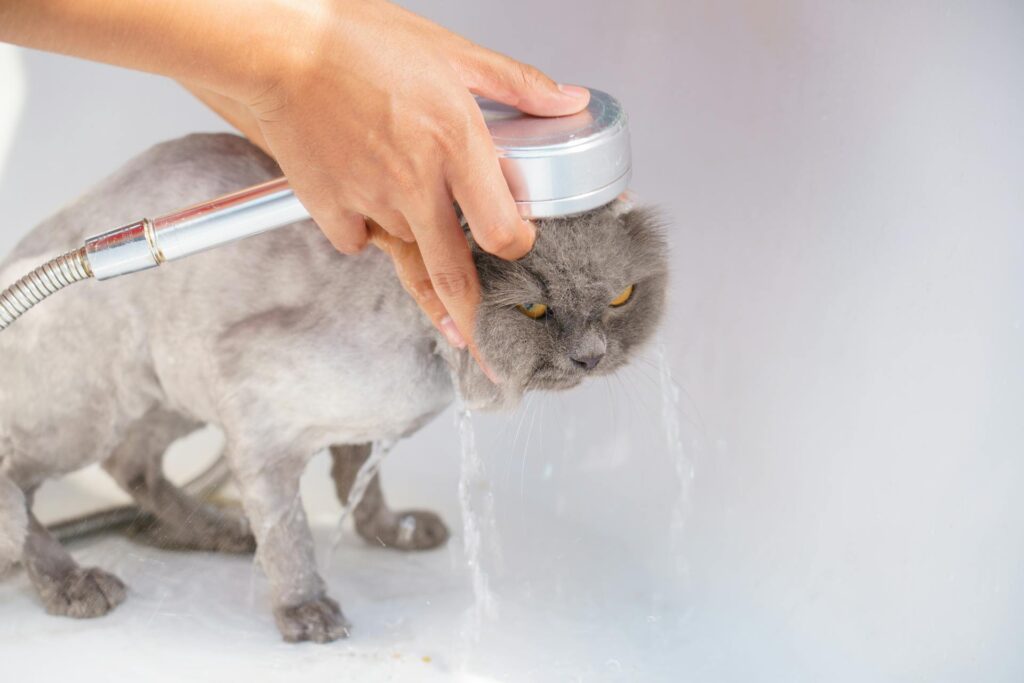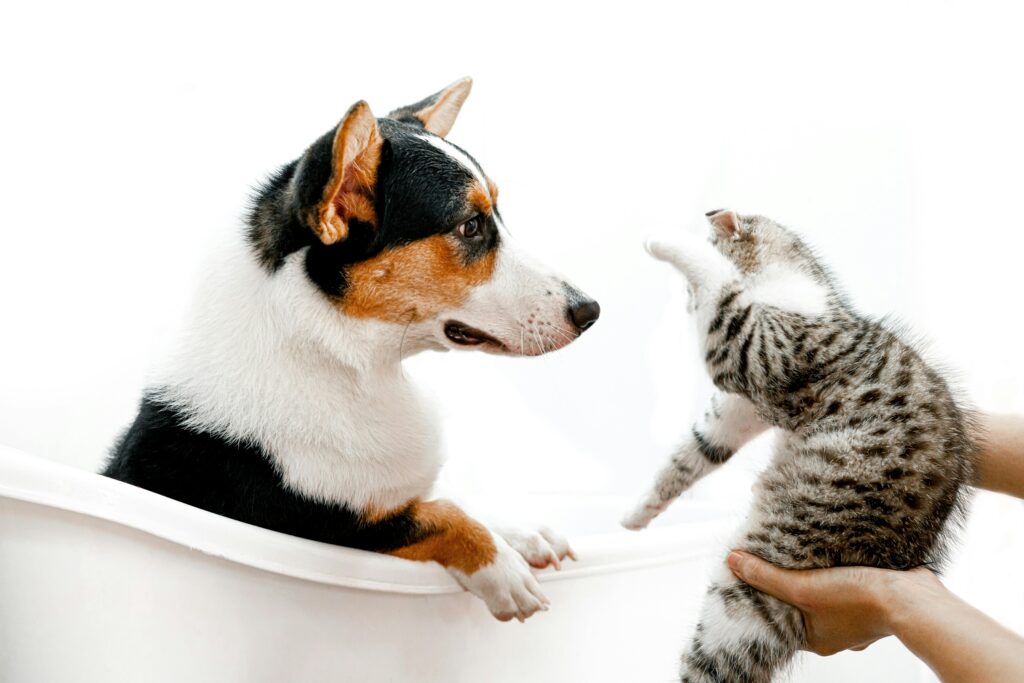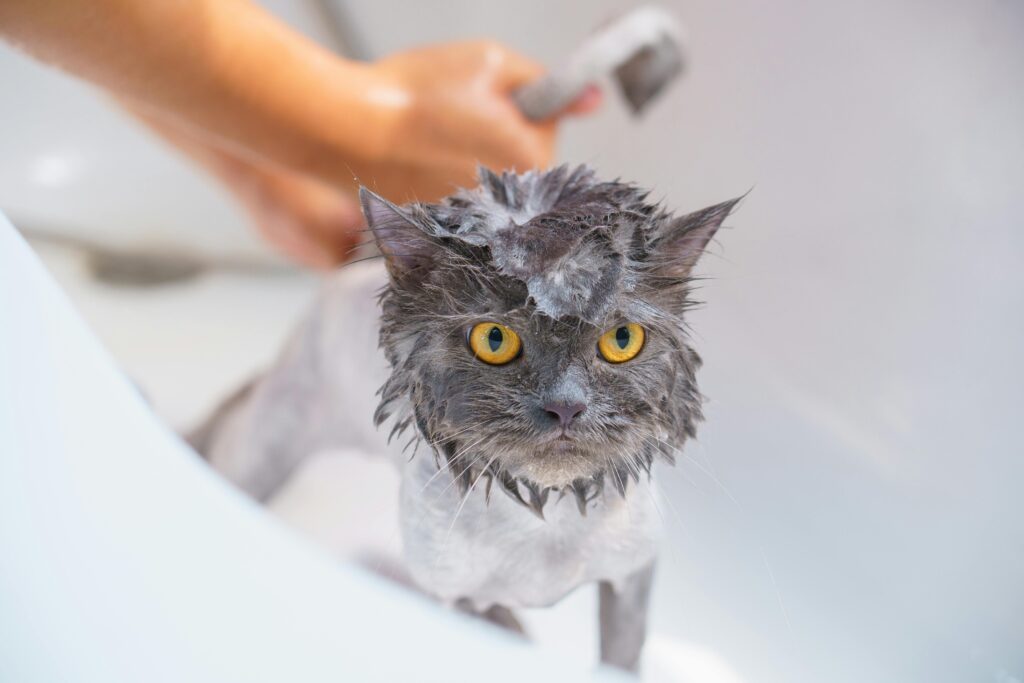Discover why using dog shampoo on your cat is detrimental to their health and well-being. Learn the risks and alternatives to keep your feline friend safe and clean.

Pet owners often find themselves in a pinch when it comes to grooming their furry companions. With dogs and cats sharing our homes and hearts, it’s not uncommon to reach for the closest bottle of shampoo when bath time rolls around. However, what many people fail to realize is that using dog shampoo on cats can lead to a myriad of problems for our feline friends.
Introduction
Cats are fascinating creatures, known for their independent nature and meticulous grooming habits. However, despite their self-sufficiency, there are times when our feline friends may need a little assistance in the grooming department. Whether they’ve encountered something particularly messy or are simply in need of a routine bath, pet owners may find themselves wondering if it’s okay to use dog shampoo on their cats. While it may seem like a convenient solution, the truth is that using dog shampoo on cats can have adverse effects on their skin and overall well-being.
Understanding the Differences Between Dog and Cat Skin

Before delving into why using dog shampoo on your cat is harmful, it’s essential to understand the fundamental differences between dog and cat skin. While both species have fur and require grooming, their skin pH levels, and grooming needs differ significantly.
Understanding the Differences in Skin pH Levels
One of the key reasons why dog shampoo is unsuitable for cats lies in the fundamental differences in skin pH levels between the two species. pH, which stands for “potential of hydrogen,” is a measure of the acidity or alkalinity of a substance. Each species has its optimal pH range which is essential for maintaining healthy skin and a strong skin barrier.
Dogs typically have a more alkaline skin pH, averaging around 7.52, whereas cats have a slightly acidic skin pH of approximately 6.43. This variance is crucial because it dictates the type of products that are suitable for each animal’s skin. Using a shampoo formulated for dogs, which is designed to match their alkaline pH, can disrupt the natural acidity of a cat’s skin. This disruption can lead to a host of problems, including dryness, irritation, and an increased susceptibility to infections.
Grooming Habits
Additionally, cats are meticulous groomers and spend a significant portion of their day licking and grooming themselves. Their grooming habits contribute to the maintenance of their skin and fur health. Dogs, on the other hand, rely more on external grooming methods and may not groom themselves as thoroughly as cats.
The Effects of Harmful Ingredients on Dog Shampoo
Dog shampoos often contain ingredients that are specifically formulated to address the needs of canine skin and coat. These may include surfactants, fragrances, and conditioning agents designed to remove dirt and oil while leaving the coat soft and shiny. While these ingredients may be perfectly safe for dogs, they can be too harsh for the delicate skin of cats.
In addition to the pH mismatch, another reason to avoid using dog shampoo on cats is the presence of potentially harmful ingredients. Dog shampoos often contain substances that can be toxic or irritating to felines, leading to adverse reactions and health complications. Some of these problematic ingredients include:
- Permethrin and pyrethrin: Commonly found in dog flea shampoos, these chemicals are highly toxic to cats, with permethrin being particularly dangerous and potentially fatal.
- Tea tree oil: While prized for its antibacterial and antifungal properties, tea tree oil can be toxic to cats if ingested or absorbed through the skin. Excessive exposure can lead to symptoms such as weakness, tremors, and even coma.
- Essential oils and fragrances: Many dog shampoos contain fragrances derived from essential oils such as cinnamon, citrus, and peppermint. While these oils may impart a pleasant scent to the shampoo, they can cause skin irritation and respiratory issues in cats.
- Isopropyl alcohol: Often used as a solvent or preservative in pet care products, isopropyl alcohol can be drying and irritating to sensitive feline skin.
Using dog shampoo on cats can lead to a range of issues, including skin irritation and allergic reactions. The harsh chemicals and fragrances found in many dog shampoos can cause redness, itching, and inflammation in cats with sensitive skin. Over time, repeated use of these products can disrupt the natural balance of the skin, leading to chronic issues such as dryness and flakiness.
Comparing the Use of Dog Shampoo to Vinegar on Human Skin
An analogy that helps illustrate the potential harm of using dog shampoo on cats is comparing it to applying vinegar to human skin. Just as vinegar, with its acidic properties, can disrupt the pH balance of human skin and cause dryness and irritation, dog shampoo, formulated for a different species with a different pH, can have similar effects on cat skin. Just as we wouldn’t subject our own skin to harsh chemicals, it’s important to treat our pets with the same level of care and consideration.
Safer Bathing Alternatives for Cats

So, if dog shampoo is off the table, what alternatives are available for bathing cats? Fortunately, there are plenty of safe and effective options that are specifically formulated for feline needs. Here are some alternatives to consider:
- Cat-specific shampoo: The safest option for bathing cats is to use a shampoo specifically formulated for feline skin. These shampoos are pH-balanced to match the acidity of cat skin and typically contain gentle, non-toxic ingredients that won’t cause irritation or harm.
- Baby shampoo: In a pinch, mild and fragrance-free baby shampoo can be used to bathe a cat. While not ideal due to the pH mismatch, baby shampoo is generally gentle enough for occasional use as long as it is thoroughly rinsed off.
- Natural castile soap: Made from vegetable oils such as olive oil, castile soap is a gentle and non-toxic option for bathing cats. Look for pure castile soap without added fragrances or essential oils to avoid potential irritation.
- Dawn dish soap: While primarily used for washing dishes, Dawn dish soap is safe for use on cats in certain situations, such as removing oil or grease from their fur. However, it’s important to rinse thoroughly to prevent skin dryness.
- Baking soda: Baking soda can serve as a dry shampoo for cats, helping to absorb odors and excess oil from their fur. Simply sprinkle a small amount onto the coat and brush it through to remove any residue.
- Pet wipes: Specially formulated pet wipes are a convenient option for freshening up your cat’s fur between baths. Look for wipes that are gentle and moisturizing to avoid drying out their skin.
- Waterless shampoo: Waterless shampoos are designed to clean and freshen up your cat’s fur without the need for water. These shampoos typically contain natural ingredients such as aloe vera and oatmeal to soothe and moisturize the skin.
By choosing products specifically formulated for cats and their unique needs, pet owners can ensure that their feline friends stay clean and healthy without risking harm to their skin or overall well-being.
Fortunately, there are plenty of cat-specific shampoos on the market that are formulated to meet the unique needs of feline skin. These products are typically milder and gentler than their dog counterparts, making them safer and more effective for use on cats. Additionally, there are natural alternatives, such as oatmeal or aloe vera-based shampoos, which can provide gentle cleansing without the risk of irritation.
Tips for Bathing Cats Safely
When bathing your cat, it’s essential to use proper handling techniques to minimize stress and discomfort. Always use lukewarm water and avoid getting water in your cat’s ears or eyes. Choose a shampoo that is specifically designed for cats, and be sure to rinse thoroughly to remove all traces of soap. Additionally, it’s important to consult with your veterinarian if you have any concerns about your cat’s skin or grooming routine.
Final Thoughts
While bathing cats may not always be the most enjoyable task, it’s important for their health and hygiene. However, it’s equally important to use the right products and techniques to avoid causing harm. When it comes to bathing cats, never use dog shampoo, as it can disrupt the natural pH balance of their skin and contain ingredients that are toxic or irritating. Instead, opt for cat-specific shampoos or explore safer alternatives such as baby shampoo, natural castile soap, or waterless shampoos. By prioritizing your cat’s health and well-being, you can ensure that bath time is a positive experience for both you and your furry friend.
FAQs
Can I use baby shampoo on my cat instead of dog shampoo?
Yes, But While baby shampoo may be gentler than dog shampoo, it’s still not ideal for cats. It’s best to use a shampoo specifically formulated for feline skin.
How often should I bathe my cat?
Most cats do not need frequent baths unless they have a medical condition or get into something messy. Consult with your veterinarian for guidance based on your cat’s individual needs.
What should I do if my cat has a bad reaction to shampoo?
If your cat experiences any adverse reactions after bathing, rinse them thoroughly with clean water and contact your veterinarian for further advice.
Are there any natural alternatives to commercial cat shampoo?
Yes, ingredients like oatmeal, aloe vera, and coconut oil can be used to make homemade cat shampoo that is safe and effective.
Can I use dog flea shampoo on my cat?
No, flea shampoos formulated for dogs often contain ingredients that are toxic to cats. Always use products that are specifically labeled for use on cats.
Sources and Further Reading
- “What Shampoo is Safe to Use on Cats?” – PawPurity
- “Give Your Kitten a Bath With These Simple Tips” – Animal Humane Society
- “How To Wash A Cat Without Cat Shampoo” – Cats.com
- Why You Should Never Use Dog Shampoo on Your Cat – Pet Helpful
Disclaimer
This article is accurate and true to the best of the author’s knowledge. It is not meant to substitute for diagnosis, prognosis, treatment, prescription, or formal and individualized advice from a veterinary medical professional. Animals exhibiting signs and symptoms of distress should be seen by a veterinarian immediately.
This expanded article provides a more in-depth exploration of the topic, covering the reasons why dog shampoo is unsuitable for cats, safer alternatives for bathing cats, and additional information for pet owners to consider. Let me know if you need further expansion or any other adjustments!
Thank you for visiting Loving Pet Parents! We’re passionate about providing helpful information and resources to pet owners. If you’ve enjoyed reading our articles, we invite you to explore more of our content on our website. You’ll find a wealth of information on pet care, behavior, nutrition, and much more. Plus, we’re always adding new articles and resources to help you give your furry friend the best possible care. So why not bookmark our website and check back regularly for new content? We appreciate your support and look forward to sharing more valuable insights with you!





